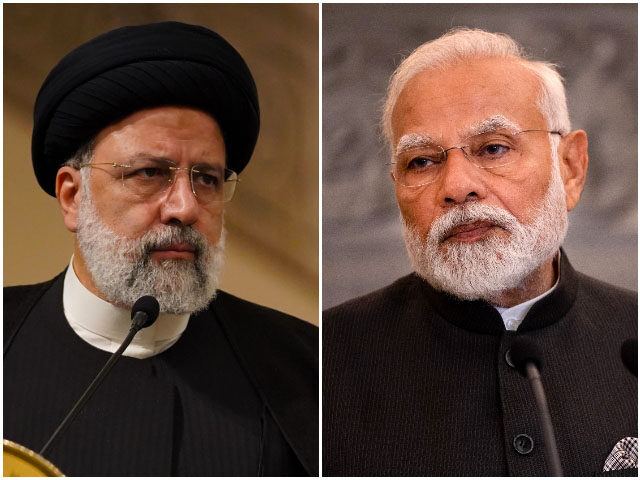Iran’s frantic effort to drag the BRICS coalition into defending the Hamas terrorists included a phone call between Iranian President Ebrahim Raisi and Indian Prime Minister Narendra Modi on Monday.
Modi described the conversation as a “good exchange of perspectives,” but did not seem enthusiastic about accepting Iran’s narrative of the Gaza war or about saving Hamas from the consequences of its actions.
“Terrorist incidents, violence and loss of civilian lives are serious concerns. Preventing escalation, ensuring continued humanitarian aid and early restoration of peace and stability are important,” Modi said after the call, touching on several topics Iran absolutely does not want to discuss.
Raisi’s narrative is that Israel is randomly bombing civilians in Gaza for no good reason and the BRICS nations should come together to prevent Israel from committing “genocide” against the Palestinians. Raisi wants an immediate and unconditional Israeli ceasefire to protect Hamas, without any consideration for the crimes against humanity committed by the Palestinian terrorists or the safety of the Israelis and other foreigners they kidnapped on October 7.
India is one of the founding members of BRICS, while Iran was just invited to join along with five other countries in August.
India’s WION News reported Raisi played the colonizer card against Modi, reminding him of India’s struggles against “Western colonialism” and its leadership of the Non-Aligned Movement. Raisi implied India should sympathize with the Palestinians because the Israelis are supposedly “colonizing” them.
Modi has supported humanitarian efforts in Gaza, but not an unconditional Hamas-friendly ceasefire like the one Raisi wants. India abstained from the October 28 United Nations vote on a resolution demanding an immediate humanitarian truce because the resolution did not include “explicit condemnation” of the Hamas atrocities and India felt there could be “no equivocation on terror.”
“Terrorism is a malignancy and knows no borders, nationality, or race. The world should not buy into any justification of terror acts. Let us keep aside differences, unite and adopt a zero-tolerance approach to terrorism,” India’s deputy representative to the U.N., Yojna Patel, said on the eve of the U.N. vote.
In a rather ironic twist, India supported an amendment to the U.N. resolution that would have condemned the Hamas atrocities – and that amendment was introduced by Canada, whose relations with India are currently fraught because leftist Canadian Prime Minister Justin Trudeau publicly accused Modi’s government of murdering a Sikh activist on Canadian soil.
India’s abstention from the U.S. vote created some controversy at home, as the opposition accused Modi of backing away from India’s historic support for the Palestinian cause.
“To refuse to take a stand and watch in silence as every law of humanity is pulverized, food, water, medical supplies, communication and power is cut off to millions of people, and thousands of men, women and children in Palestine are being annihilated goes against everything our country has stood for throughout its life as a nation,” said Priyanka Gandhi Vadra, general secretary of the opposition Congress party.
Modi’s administration has its own terrorism concerns, prominently including the above-mentioned Sikh separatists. India has also been growing increasingly close to Israel over the past few years. Last week, reports claimed Israel’s construction sector asked for permission to hire up to 100,000 Indian workers to replace Palestinians who lost their work permits after the Hamas attack.
As with the Russia-Ukraine war, where India has attempted to preserve its longtime relationship with Russia even as most of its free-world allies sided with Ukraine, the Gaza war is forcing India to balance its historic support for the Palestinians with its deep concerns about terrorism. Another wrinkle is that India aspires to leadership of the “Global South,” a broad swath of developing nations who likewise have sympathies for the Palestinian cause but worry about legitimizing terrorism.
Ananta Aspen Center CEO Indrani Bagchi told Nikkei Asia on Saturday that the Global South is not as reflexively pro-Palestinian as some observers assume.
“The Global South has been one of the biggest victims of terrorism. There have been many countries, apart from India, which have been targeted by jihadist terrorism for years,” Bachi pointed out.
The Diplomat noted that India is now buying about $2 billion in arms from Israel every year, accounting for almost a third of Israel’s military exports. Modi was one of the first leaders to publicly condemn the October 7 Hamas atrocities and India’s large and fractious population has generally supported Israel during the current conflict.
Some of the more cynical international analysts told The Diplomat they expected Modi to fold the savagery of Hamas into his Hindu nationalist political platform, ostentatiously supporting Israel as a way of reminding Indians they have a large and restless Muslim population to worry about.
Another cynical view is that India was eager to condemn Hamas terrorism to win back some of the favor it lost in Western capitals by refusing to condemn Russia’s invasion of Ukraine, but Modi does not want to lean too hard in that direction, for fear of losing Middle East influence to its rival China.

COMMENTS
Please let us know if you're having issues with commenting.